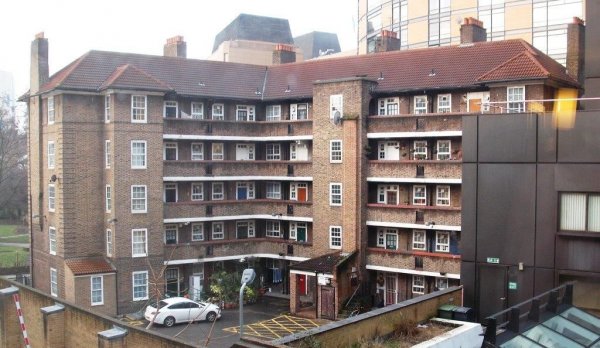Sep 9th 2014, 12:33
-
Last Wednesday I chaired Impact Housing Association’s September board meeting that was held at the Old Brewery Halls of Residence in Carlisle. The main items on the agenda were Value for Money, Finance and Development – all of which are subjects that are closely linked.
One of the main problems is that, right across the sector, housing associations are nearing the limit of their capacity for new borrowing to fund new development. There are two main problems:
· ‘Gearing’ – the fact that one of the conditions of borrowing from the banks is usually a limit on the total amount that a housing association can borrow in relation to the value of its housing stock.
· The banks require an increasing number of housing units to be identified as ‘security’ and therefore the number of units that are available to act as ‘security’ for new loans is dwindling.
Impact Housing Association is in a better position than many in the sector but it is an issue that we need to monitor. Many are predicting that most housing associations will run out of capacity to develop shortly after 2015 – the year of the general election!

The Old Brewery Halls of Residence in Carlisle.
More information is on the Impact website:http://www.impacthousing.org.uk/student-accommodation
We are told that, following the outcome of the referendum on Scottish independence, all the main political parties are now committed to devolution in England as well as Scotland, Wales and Northern Ireland. It is therefore rather concerning that Deputy Prime Minister, Nick Clegg MP, leader of the Liberal Democrats (who are often regarded as the most devolutionist of the three parties) has told ‘Public Finance’ that:
“The Treasury doesn’t like it (devolution). I mean no offence to the people of the Treasury, but it’s the DNA of the Treasury to control everything that moves across the country as far as finance is concerned. They have a legitimate concern about the stability of finances.”
I will watch the progress of English devolution with interest.
Now for some technical accounting! In the September edition of the 'AWICS Housing News' I talked about the problem of local authorities having to treat impairment losses (downward revaluations of assets) as a ‘real’ cost to their housing revenue account and thus to their tenants. I now understand that some local authorities have decided to get round this by reclassifying garages and shops as investment properties rather than as operational assets. They have apparently agreed this with their auditors.
I don’t think there should be a problem defining them as investment properties as they are defined in the guidance as:
“A separate class of property (land or a building, or part of a building, or both) that is held solely to earn rentals or for capital appreciation, or both, rather than for:
However, the Housing Act 1985 part II defines what can be accounted for in the housing revenue account and while it includes garages and shops as operational assets it does not appear to allow local authorities to hold investment properties in the housing revenue account. I would therefore have thought that if garages and shops are reclassified as investment properties they would have to be appropriated to the general fund with any surpluses going to the general fund (council tax payers) rather than to the housing revenue account (tenants).
A copy of the September 2014 edition of the 'AWICS Housing News' can be freely downloaded from HERE
This week I will be in Enfield providing some in-house training in local authority housing finance at Enfield Homes. Enfield Homes is an Arm’s Length Management Organisation (ALMO), set up by Enfield Council in April 2008 to manage its homes and to improve housing services. I am looking forward to it. More information on Enfield Homes can be found on their website at: http://www.enfield.gov.uk/Enfieldhomes/# and more information about our in-house courses can be found on the ‘AWICS’ website at:https://awics.co.uk/inHouseCourses.asp
The next ‘AWICS’ seminars and workshops will be held in London in November. We still have a few places available. Details are as below:
Last week we published the September edition of the ‘AWICS’ Housing News. It includes articles on:
Your copy can be freely downloaded from:https://awics.co.uk/dynamicdata/data/docs/awics%20housing%20news%20-%20september%202014.pdf
I recently visited Catalyst Housing Association’s regeneration scheme at Wornington Green in Kensington.Built between 1964 and 1985 Wornington Green estate consists of 538 homes made up mainly of flats in six-storey connected blocks. The regeneration plans include building 538 quality affordable homes of mixed sizes and twenty new retail units for Portobello Road – generating up to 200 new jobs as well as homes for private sale. A connecting road will be constructed to better integrate the estate into the surrounding community and a new community centre will be built. The scheme was granted planning approval for phase one of the five phase scheme by the Royal Borough of Kensington and Chelsea in March 2010. Phase one includes the building of 324 new homes, a mix of 174 for affordable rent and 150 homes for private sale. Catalyst has been given the go-ahead for phase two of the regeneration and hopes to begin work onsite in the autumn of 2015. More information is available on the Catalyst Housing Association website at:http://www.chg.org.uk/development-regeneration/regeneration/regeneration-schemes/wornington-green-kensington/


It is widely accepted that there is a lack of affordable housing in the United Kingdom with house price rises for 2014 almost twice as high as predicted. First time buyers are struggling to get onto the property market in cities throughout the United Kingdom where nine out of ten houses are too expensive for locals. An eco-home can be defined as a structure and using process that is environmentally responsible and resource-efficient throughout a building's life-cycle: from siting to design, construction, operation, maintenance, renovation, and demolition. Our latest briefing paper is on Eco Houses and asks the question whether Eco Homes are the answer to the United Kingdom’s housing and climate change issues? Your free copy can be downloaded from:https://awics.co.uk/dynamicdata/data/docs/eco%20homes%20-%20briefing%20paper.pdf
The Homes & Communities Agency has recently produced a revised regulatory code that includes a new approach to risk. This is based on risk being an integral part of the business of housing associations in a situation where the government wants them to ‘sweat the assets’. Housing association risks are becoming more complex as they diversify. Risks need to be assessed in terms of the possible effects on the wider organisation – an approach that is often called ‘scenario planning’, ‘what-ifs’, ‘stress testing’ or ‘multivariate analyses’. The regulator is concerned that housing associations consider the risks to the three elements of their business: affordable housing, contracts and commercial activities) separately.
The Greater London Authority, Scottish Housing Regulator and Welsh Government are also concerned about the effective management of risk in housing associations while, in its guide to housing self-financing the Chartered institute of Public Finance & Accountancy identified the main risk factors that local authorities should consider. In response to this ‘AWICS’ has launched a new in-house training product in risk management in social housing. For further information please see https://awics.co.uk/inhouserisk.asp
Last week we published the September edition of the Public Services News. It contains articles on:
Your copy can be freely downloaded from HERE
It is always good to receive compliments. One that we received about our newsletter was from a member of Eden District Council who wrote:
“What an excellent paper – or set of papers: relevant, informative and clearly written. Thanks.”
We are currently advertising for a Marketing Advisor who will assist us in reviewing and developing our current marketing strategy with a view to increasing our activity and profitability. In making the recruitment we are working in partnership with the University of Cumbria under the European Union’s UNITE programme and while the appointee will work with AWICS they will actually be employed by the University. The closing date for applications is 19th September 2014 and further information about the position and the appointment process can be downloaded from HERE
Last week I visited Calico Homes in Burnley. Calico Homes owns and manages approximately 4,600 homes in Lancashire and aims to make a difference to the quality of life of individuals and the wider communities in which it works. They provide accommodation for families and older people, plus student housing, supported housing and services for homeless people.
Calico Homes is part of the Calico Group of innovative businesses and charities working together to make social profit, rather than financial profit, the driving force behind our wide range of high quality services. They define social profit as the positive difference they make to people’s lives, across all the communities in which they work. They create social profit by developing innovative services, and harnessing the opportunities of their unique group structure. More information about Calico Homes is available on their website at:http://www.calico.org.uk/template-87.php?WorkingPage=1540&WorkingSection=1998&ParentSection=0&Menu=2&TopLevelSection=1998

Selby District Council has a long-running planning issue on the site of the battlefield of Towton that is now the subject of an appeal. It relates to a temporary site for travellers for which the Council had originally been obliged to give planning permission due to a lack of alternative travellers’ sites in the district. Having arranged alternative sites the Council is now attempting to close the site through issuing an enforcement notice. However, the owner of the site has now appealed against the enforcement notice for the continuation of the use of the land as a gypsy caravan site including the retention of caravans, hard standing, lighting and chattels including sheds, a lorry trailer body and a portaloo. This provides an interesting example of the conflict between the need to preserve the site of a battlefield and the need to provide suitable accommodation for the travelling community. Further information is available on the Council’s website at:http://public.selby.gov.uk/online-applications/applicationDetails.do?activeTab=summary&keyVal=NALINONX09200
Last week I was in London for the National Housing Federation’s Leaseholder and Tenant Service Charges Conference. I spoke on:
In my second session I concluded that there is a need to:
The event was well attended and the sessions were well received. This demonstrates the increasing interest in service charges among people who are involved in social housing.
I have posted copies of my slides and a briefing paper that summarises the presentations of the other speakers on my website. These can be found at: https://awics.co.uk/nhfconference.asp
I was interested to read the results of the ‘Big Tenant Survey’ of 61,000 tenants. This found that only 32% of people were satisfied that their landlord ‘listens to them and acts upon their views’, while just 22% feel that their landlord ‘cares about them and their family’. Londoners were the most dissatisfied tenants responding to the survey with only 16% (national average 24%) saying they would recommend their council or housing association landlord to a friend or relative, and 17% (national average 22%) saying they feel their landlords care about them and their family. There is clearly much to be done by local authorities and housing associations to provide better homes, services and communications. I think that the key to doing this is to consider residents as stakeholders and to empower them to take decisions about their homes and communities.
Information about our independent residents’ advice services can be found at:https://awics.co.uk/IndependentTenantAdvice.asp
Local Government provides a wide range of services with Education, Adult Social Care and Highways & Transport being the largest budgets. The present government has moved away from providing local authorities with specific grants in favour of general grants that leave local authorities with choices regarding the allocation of their resources. At the same time they have made significant reductions in total funding forcing local authorities to decide where specific savings have to be made. An exception is Education that continues to be funded by specific grants that have been protected in real terms. At the same time local authorities face increasing demands, needs and costs – especially in Adult Social Care and Waste Management.
Last week we published a briefing paper that considers issues with specific local government budgets. It includes sections on: Education and Children’s Services, Adult Social Care, Public Health, Supporting People, Highways and Transport, Housing General Fund, Central Services, New Homes Bonus, External Trading Services, Police and Waste Management. Your free copy can be downloaded from:https://awics.co.uk/dynamicdata/data/docs/local%20government%20budget%20issues%20-%20briefing%20paper.pdf
This week I will be in London for the National Housing Federation’s Leaseholder and Tenant Service Charges Conference in London on 3rd September 2014. I will speak on:
More information is available on the National Housing Federation website at:http://www.housing.org.uk/events/browse/leaseholder-and-tenant-service-charges
If you are unable to attend the National Housing Federation conference but want to know more about service charges, you could either attend the AWICS seminar and workshop ‘All You Want to know about Service Charges’ on 19th November or buy our publication ‘All You Want to know about Service Charges’. Further information is available at:

China Walk in Lambeth. Service Charges tend to be highest and most controversial in flats.
Last week we published a briefing paper on local government income and revenues. The purpose of this briefing paper is to provide a summary and overview of the income and revenues that are currently received by local authorities in England. It includes sections on: Council Tax, Council Tax Freeze Grants, Council Tax 2014, Council Tax Support, Council Tax Review, Business Rates, Localisation of Business Rates, Formula Grant and Sales, Fees & Charges. Your free copy can be downloaded from:https://awics.co.uk/dynamicdata/data/docs/local%20government%20income%20%20revenues%20-%20briefing%20paper.pdf
It is interesting to note that many councils are now buying houses on the open market in preference to building new council houses. Sheffield City Council, for example, has calculated that buying houses on the open market is cheaper than developing new ones; while Milton Keynes Borough Council finds that it is quicker to buy a house on the open market than to build a new one; and New Forest District Council finds that building new homes is difficult because of planning constraints. However, Birmingham City Council is opposed to the idea on the grounds that while buying houses on the open market adds to the supply of social housing it does not add to overall housing supply; while Ealing Borough Council has calculated that buying houses on the open market does not provide value for money.
This demonstrates the wider range of options that councils now have for the provision of social and affordable housing as they tackle the increasing demand for homes and the housing shortage. At the same time, the government’s right to buy initiative does not appear to be achieving its objective of generating enough receipts to fund ‘one-for-one’ replacement with more than 20,000 social homes having been sold since the start of the initiative compared with only 3,634 replacement homes being started.
These will be among the issues that are considered at our seminar and workshop ‘All You Want to Know about Local Authority Housing Finance’ that will be held in London on 18th November 2014. Further information is available at: https://awics.co.uk/lahfin.asp